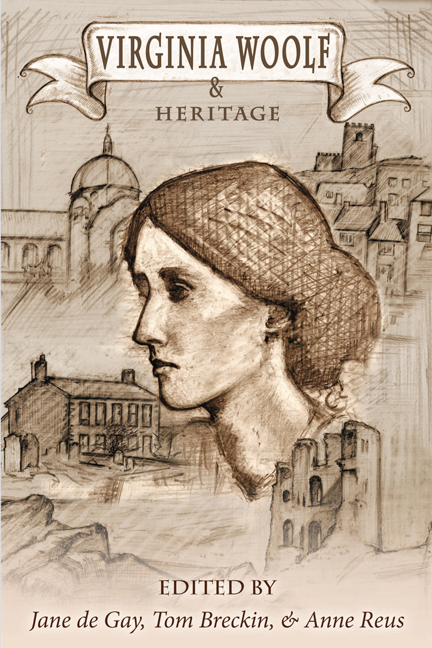Book contents
- Frontmatter
- Contents
- Introduction
- List of Abbreviations
- HERITAGE: A DEBATE
- HERITAGE, EDUCATION, AND MENTORING
- HERITAGE SPACES
- Virginia Woolf and the Artistic Heritage of St. Ives
- “The little bit of power I had myself ”: Lady Lasswade's Shifting Sense of Place in The Years
- Through the Arch: The Country House and the Tradition of English Tyranny in Woolf 's Between the Acts
- Heritage Hoarding: Artifacts, Archives, and Ambiguity, or, the Saga of Virginia Woolf 's Standing Desk
- “Against you I will fling myself, unvanquished and unyielding, O Death!”: Vanessa Bell's Death of the Moth Dust Jacket as Monument to Virginia Woolf
- LITERARY AND CULTURAL HERITAGES
- QUEER PASTS
- MODERNISM AND HERITAGE
- WRITING LIVES AND HISTORIES
- WOOLF'S LEGACIES
- FINALE
- Notes on Contributors
“The little bit of power I had myself ”: Lady Lasswade's Shifting Sense of Place in The Years
from HERITAGE SPACES
- Frontmatter
- Contents
- Introduction
- List of Abbreviations
- HERITAGE: A DEBATE
- HERITAGE, EDUCATION, AND MENTORING
- HERITAGE SPACES
- Virginia Woolf and the Artistic Heritage of St. Ives
- “The little bit of power I had myself ”: Lady Lasswade's Shifting Sense of Place in The Years
- Through the Arch: The Country House and the Tradition of English Tyranny in Woolf 's Between the Acts
- Heritage Hoarding: Artifacts, Archives, and Ambiguity, or, the Saga of Virginia Woolf 's Standing Desk
- “Against you I will fling myself, unvanquished and unyielding, O Death!”: Vanessa Bell's Death of the Moth Dust Jacket as Monument to Virginia Woolf
- LITERARY AND CULTURAL HERITAGES
- QUEER PASTS
- MODERNISM AND HERITAGE
- WRITING LIVES AND HISTORIES
- WOOLF'S LEGACIES
- FINALE
- Notes on Contributors
Summary
Class is a complicating factor for Virginia Woolf 's feminist affiliations. Though she focuses primarily on “the daughters of educated men” as in Three Guineas (118), Woolf 's essays and novels feature titled women who use their social positions in assertions of agency both complicit with and resistant to the patriarchal status quo. The complex politics of such upper-class female characters, and the ambivalence with which Woolf regards classed privilege, are strikingly presented in The Years through the complicated figure of Kitty Lasswade, or more specifically, through Kitty's body. In his introduction to The Pargiters, Mitchell Leaska identifies the restrictions that “subdued Kitty's sexual nature to the point that her physical responses were unnaturally weakened” (xi); yet, the physicality of this character crops up repeatedly in The Years, as Woolf emphasizes Kitty's size, sexual desires, vigour, restlessness, and especially her sense of being “a bull in a china shop” (TY 826). Kitty's bodily awkwardness draws attention repeatedly to the performative reiteration of gendered and sexed behaviour associated with the late-Victorian educated man's home. In a novel that portrays “the ‘everyday’” as “a site where structures of domination are actualized and hence more easily naturalized” (Spiropoulou 123), the apparent incongruity of her body resists such naturalization and is instead a marker of her shifting intersectionality.
As the daughter of an educated man, Kitty's discomfort is accompanied by shyness, which suggests her internalization of norms, but also by anger, which connects to Rose's militant suffragism and to Eleanor's outburst at the photograph of the fascist “bully” (TY 298). Kitty's own resistance to patriarchal domination takes the form of movement, however, and especially a repeated movement to the north of England, which is associated with physical freedom and with a desire for men who are not Edward Pargiter and instead align with an autonomous vision of her self. Kitty maintains the fitness of her decision to reject Edward and Oxford; but while becoming Lady Lasswade provides her with financial agency, the tone with which she reflects upon her options as a younger woman—“Pity one can't live again” (379)—speaks to her recognition of the exclusions at the base of both Oxbridge mastery and patrilinear capital.
- Type
- Chapter
- Information
- Virginia Woolf and Heritage , pp. 60 - 66Publisher: Liverpool University PressPrint publication year: 2017



